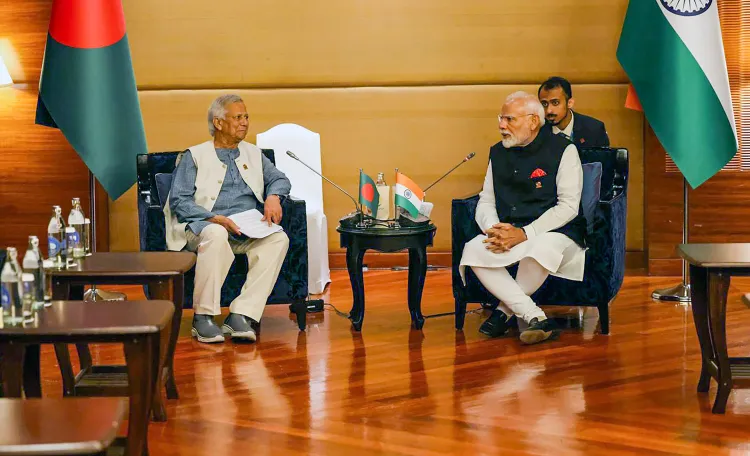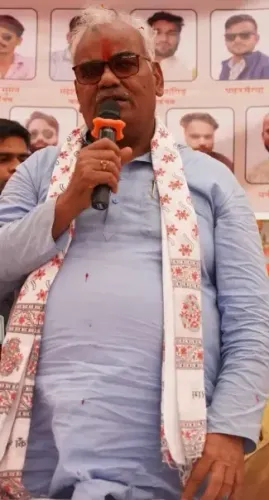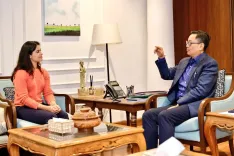India Anticipates Positive and Collaborative Relations with Bangladesh: MEA

Synopsis
Key Takeaways
- India remains committed to positive ties with Bangladesh.
- Transshipment facility terminated due to port congestion.
- Decision made by the Central Board of Indirect Taxes and Customs.
- Both nations signed an agreement for using Chittagong and Mongla Ports.
- Prime Minister Modi raised minority safety issues during talks.
Dhaka, April 17 (NationPress) On Thursday, India reaffirmed its commitment to fostering a positive and constructive relationship with Bangladesh, despite certain trade challenges, including the recent cancellation of the transshipment facility.
"India is eager to maintain a positive and constructive relationship with Bangladesh. We advocate for a democratic, inclusive, and prosperous Bangladesh. Regarding trade matters, we announced last week the termination of the transshipment facility due to the congestion observed at our ports and airports," stated Randhir Jaiswal, spokesperson for the Ministry of External Affairs (MEA), during a regular media briefing in New Delhi on Thursday.
On April 8, citing significant congestion at its airports and ports, India announced the cancellation of a transshipment facility that permitted Bangladesh to export cargo to third countries via Indian customs stations.
"The transshipment facility provided to Bangladesh has over time led to considerable congestion at our airports and ports. Logistical delays and increased costs were obstructing our own exports and causing backlogs. Consequently, the facility has been withdrawn effective April 8, 2025. To clarify, these measures do not affect Bangladesh's exports to Nepal or Bhutan that transit through Indian territory," Jaiswal added last week.
This facility was initiated in June 2020, and the decision to withdraw it was made by the finance ministry's Central Board of Indirect Taxes and Customs.
"The circular dated June 29, 2020, as modified, has been decided to be rescinded with immediate effect. Cargo that has already entered India may exit the Indian territory following the procedures outlined in that circular," a notification from the Central Board of Indirect Taxes and Customs (CBIC) stated on April 8.
The facility, introduced by New Delhi, aimed to improve regional connectivity and facilitate trade between Bangladesh and third countries by utilizing India as a transit corridor.
"India's move to revoke the transshipment facility for Bangladesh highlights Prime Minister Narendra Modi Ji's steadfast commitment to protecting national interests and the security of the Northeast region. This decisive action exemplifies the government's firm position on safeguarding India’s strategic and economic priorities," remarked Assam Chief Minister Himanta Biswa Sarma on X.
This action followed controversial remarks made by Muhammad Yunus, the Chief Advisor of the interim government in Bangladesh, during his recent trip to China.
"The seven states of India, located in the eastern part of the country, are known as the Seven Sisters. They are a landlocked region with no access to the ocean. We are the only guardians of the ocean for this region, which opens up immense possibilities. This could be an extension of the Chinese economy," Yunus stated during a high-level roundtable on sustainable infrastructure and energy in Beijing.
Earlier this year, both nations operationalized the Agreement for the utilization of Chittagong and Mongla Ports in 2023, allowing India to use these ports in Bangladesh for transit cargo between Northeast India and the mainland, significantly reducing transportation costs and time.
Earlier this month, Prime Minister Narendra Modi raised concerns regarding the safety and security of minorities in Bangladesh, including Hindus, during his meeting with Yunus on the sidelines of the BIMSTEC Summit in Bangkok.
This meeting in Bangkok was the first in-person discussion between the two leaders since the ousting of the Awami League government led by former Prime Minister Sheikh Hasina and the establishment of the interim government under Yunus's leadership in the neighboring country last August.
During their talks, Prime Minister Modi urged that any rhetoric that could create a hostile environment should be avoided and expressed his belief that all matters of mutual interest between the two nations would continue to be addressed and resolved bilaterally through constructive discussions in the interest of the long-standing bilateral relationship.
int/scor/as









